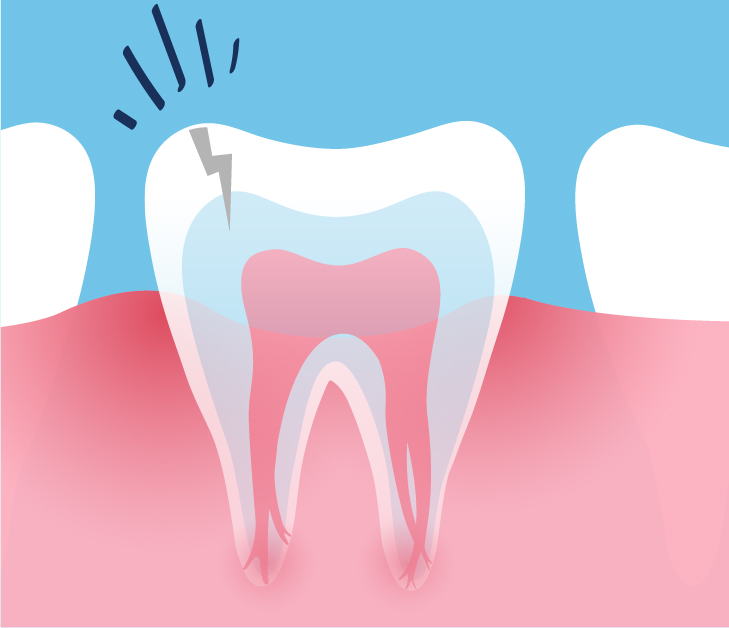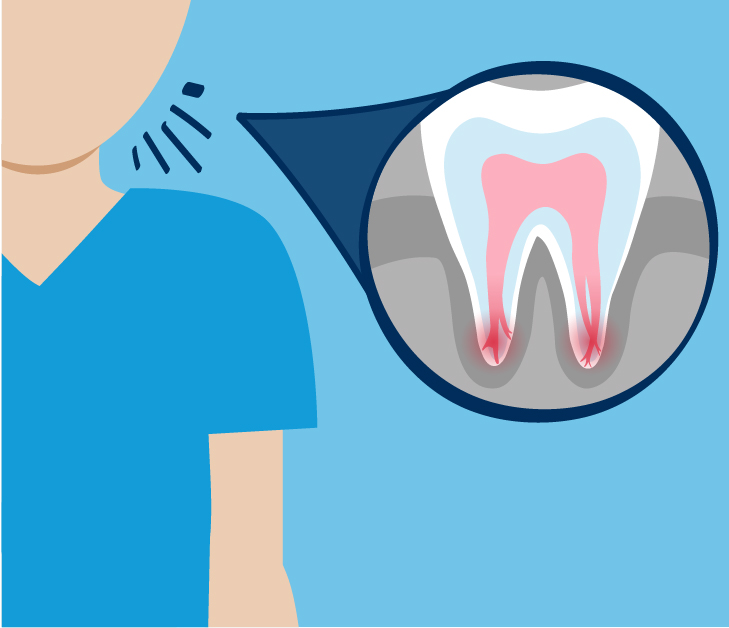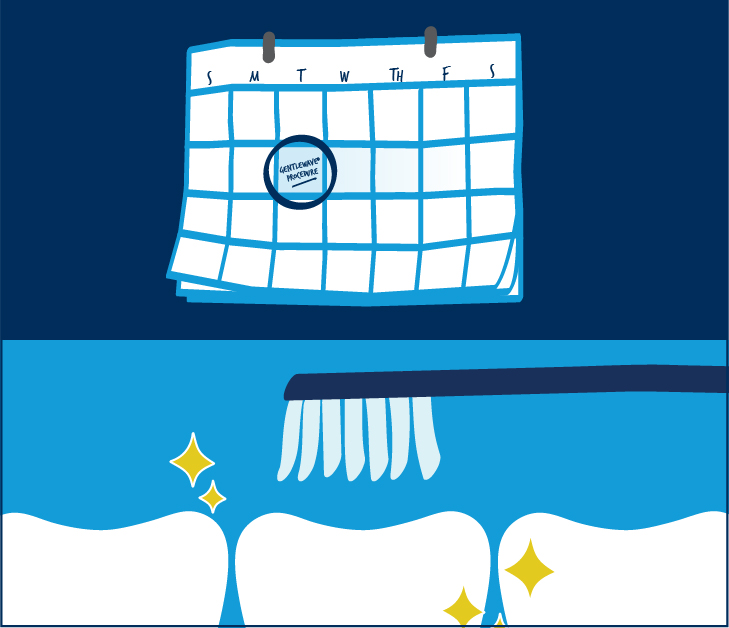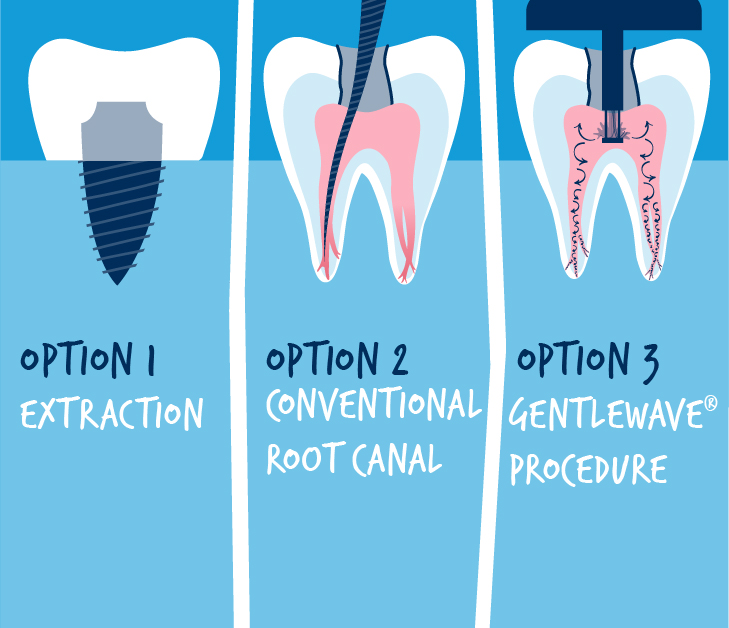Are you suffering from a root canal system infection?
Before scheduling a treatment, it’s important to understand what causes a root canal system infection, what your treatment options are and what to do following your treatment. We’ve put together a helpful list of questions to ask your endodontist to ensure you get all the information you need.
Question 1: What causes a root canal system infection?
The pulp, which is the soft tissue inside the root canal, can become inflamed or infected for a variety of reasons, including :
:
- Deep decay;
- Repeated dental procedures on the tooth;
- A faulty crown, or;
- A crack or chip in the tooth*
Additionally, an injury to the tooth can cause damage to the pulp, even if there is no visible crack or chip.*
Understanding the origin of your root canal system infection will help determine which treatment options are viable for resolving your infection, as well as help you take steps toward preventing the need for a root canal in the future.
Question 2: Why do I need to treat my root canal system infection?
 If you’re in need of a root canal, you’re probably already facing one of the common root canal symptoms, including:
If you’re in need of a root canal, you’re probably already facing one of the common root canal symptoms, including:
- Severe pain while chewing or biting;
- Pimples on the gums;
- A chipped or cracked tooth
- Lingering sensitivity to hot or cold, even after the sensation has been removed;
- Swollen or tender gums, or;
- Deep decay or darkening of the gums**
Delaying treatment will ultimately only make these root canal symptoms worse and potentially cause larger issues, including:
- Increased pain
- Infection
- Swelling
- Bone loss around the tooth
Any infection can also spread to the surrounding tissue in the mouth and the longer you avoid treating the infection, the further the infection can spread in your body. In more severe cases, an untreated root canal system infection can even spread to the jaw, the face or the bloodstream.***
Question 3: What are my treatment options?
When reviewing your treatment options, you’ll ultimately want to work to save your natural tooth through an endodontic treatment, as saving your natural tooth offers a number of advantages, including:
- Efficient chewing;
- Normal biting force and sensation;
- Natural appearance, and;
- Protection of other teeth from excessive wear or strain**
“If you can save your tooth, it will provide such a benefit to your overall health and even your longevity.” – Dr. Sonia Chopra, GentleWave® Doctor
You can choose an extraction, which involves removing the infected tooth and replacing it with an implant or bridge. Unfortunately, extractions eliminate the benefits of your natural tooth—and are typically more expensive than an endodontic treatment.**
“If the root canal has a questionable or unfavorable prognosis, the patient may decide to extract instead of investing time and money into a tooth that may not last; however, root canals have a high success rate and should be considered as the primary option, if possible.” – Dr. Karen Potter, GentleWave Doctor
Fortunately, your endodontist is a root canal specialist who has the experience to help save your natural tooth. Endodontists complete an additional two or more years of specialized training beyond dental school, making them specialists in saving teeth.† If you’re looking to maintain your natural tooth, there are two primary treatment options to discuss with your endodontist: conventional root canals and the GentleWave® Procedure.
During a conventional root canal, files and treatment fluids are used to remove the infected pulp tissue, and the interior of the tooth is cleaned, filled and sealed. This treatment option helps preserve your natural tooth but can take two appointments to complete.** Additionally, post-treatment complications can occur with a conventional root canal that may warrant a retreatment of the tooth—or even surgery.††
The GentleWave Procedure, though, is a root canal alternative that can typically be completed in just one appointment4 and is so effective at cleaning the root canal system,1,2 there’s less chance of needing a root canal retreatment.4 The GentleWave Procedure’s minimally invasive1 protocol helps preserve more of the natural tooth structure4—and promotes fast healing.4
“The GentleWave Technology is the most effective and efficient way to clean root canals.” – Dr. Marcus Palermo, GentleWave Doctor
Work with your endodontist to determine which treatment option is best for your situation but remember that you should prioritize saving your natural tooth, if possible.
Question 4: Can I increase my chances of a successful root canal recovery?
Immediately following treatment, you should avoid eating until the numbness wears off to limit the risk of biting your cheek or tongue. You should also avoid chewing or biting on the treated tooth until it's fully restored so that you don’t damage it.
Ensure that you schedule and complete any follow-up appointments, including completing the final crown. This appointment should be scheduled as soon as possible for optimal results, as a properly treated and restored tooth can offer the same longevity as a natural tooth.†††
Proper oral health care following your procedure is also critical for long-term success. You should ensure that you brush twice a day, floss once a day and keep up with twice-yearly dental cleanings and exams.†*
“With the GentleWave Procedure, I have seen a decrease in postoperative symptoms that used to require patients to take anti-inflammatory medication.”– Dr. Mark Limosani, GentleWave Doctor
To increase your chances of success from the start, you should opt to treat your root canal system infection with the GentleWave Procedure.
Question 5: How can I find a GentleWave® Doctor?
Finding a nearby GentleWave Doctor is simple!
“The GentleWave® Procedure was finally the solution for me after two failed root canal treatments. It was a night and day experience!” – C. Leslie, GentleWave Patient
Head to our Doctor Locator and find a nearby GentleWave Doctor to experience:
- Relief from your root canal symptoms
- An alternative to root canal processes of the past
- Fast root canal recovery4
- Reduced chances of root canal retreatment4
Schedule your consultation today!
*AAE
**AAE
***HealthLine
†AAE
††WebMD
†††AAE
†*Colgate

